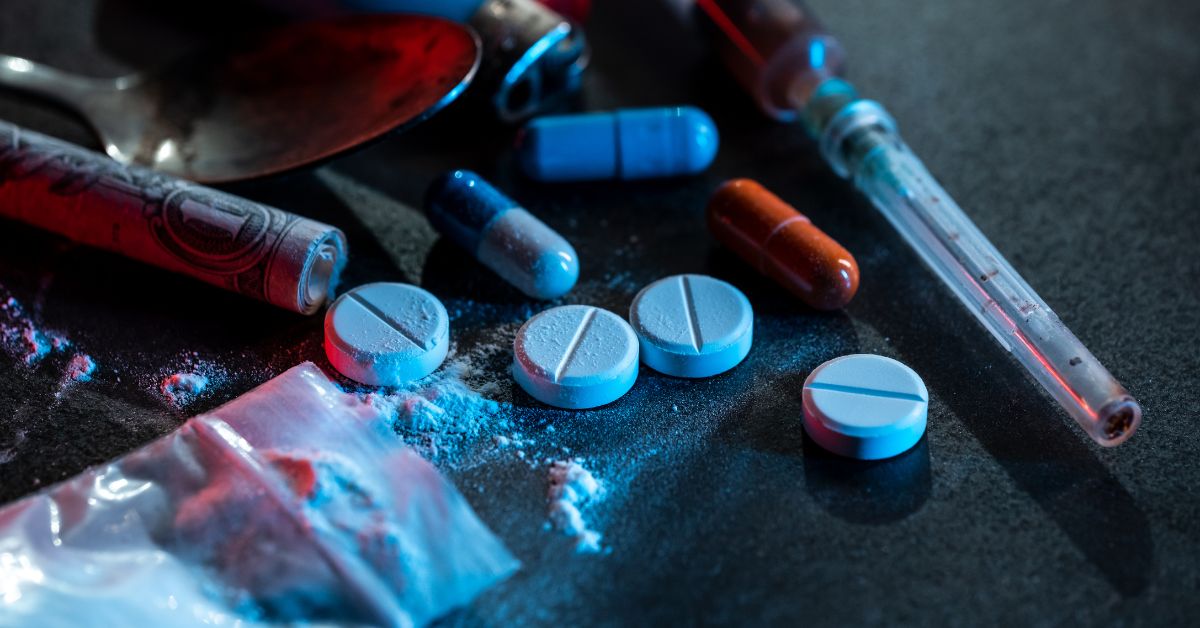When someone struggles with addiction, it can feel like they’re stuck in a never-ending cycle of destructive behavior and hopelessness.
But there is a way out. By breaking free from addiction’s grip, your loved one can overcome their drug or alcohol use and create a more meaningful life.
Let’s discover the cycle of addiction. You’ll learn about its stages, how to break free, and how your loved one can develop the strength to succeed in recovery.
An In-depth Look at the Cycle of Addiction
Addiction is not a sudden illness that appears overnight. Instead, it’s a gradual process. This process is called the ‘addiction cycle,’ where a seemingly harmless habit can turn into a harmful dependence and eventually lead to chronic addiction.
What is it?
The addiction cycle is a pattern that people often experience when dealing with substance abuse or addictive behaviors. It’s not just about substance use but also emotional and physical changes.
Key characteristics of the addiction cycle typically include:
- Initial use is often driven by curiosity or external influence.
- Regular use leads to increased tolerance.
- Constant cravings for the substance or behavior.
- Inability to stop despite negative consequences.
- Relapsing even after long periods of abstinence.
The Insidious Nature of Addiction
Addiction destroys everything it touches. It gradually becomes a permanent resident, disrupting everyday life while pretending to be normal.
Some signs of the addiction cycle are:
- Substance use increases over time, and the person becomes dependent without realizing it.
- As an individual develops tolerance, they may require larger doses to achieve the same effect.
- When someone struggles with addiction, they start organizing their life around it.
- People dealing with substance use often avoid or deny any problems arising from their addiction.
UPDATED: Discover the 3 life-changing things about addiction I wish I knew years ago
Perpetual Cycle & Consequences
The cycle of addiction may not break over time. In reality, the longer it persists, the harder it’ll be to avoid high-risk situations for relapse, and the greater the chances of negative impacts.
These consequences extend beyond physical and emotional health impacts. It can affect various aspects of life, including relationships, careers, and self-esteem.
The most common consequences of addiction are:
- Decline in physical health and increased risk of diseases.
- Increased feelings of anxiety, depression, and low self-esteem.
- Damage to personal and professional relationships.
- Legal issues and financial troubles.
Addiction can feel like a never-ending spiral, but it doesn’t have to be. Now that you understand the addiction cycle and its nature, you are ready to discover how it manifests in everyday life. Recognizing the stages of addiction can make it easier to spot the severity of your loved one’s issue.
Stages of the Addiction Cycle

Understanding how a simple act can lead to a catastrophic outcome requires us to examine the stages that lead to addiction. There, we can find complex processes beneath the surface contributing to addiction.
Experimentation and Introduction
People who are new to a particular social circle might feel pressured to fit in. As a result, they may turn to substances. Unfortunately, drug use can become a regular part of their daily life during this time.
The following signs are common during the experimentation stage:
- Consumption starts from curiosity, exploration, or as a way to escape from reality.
- The individual overlooks significant adverse effects.
Regular Use & Routine
When individuals first try addictive substances, they may enjoy the experience and want to use drugs more often. Eventually, they develop dependency.
The key characteristics of this stage are:
- Drug use becomes predictable and part of daily routine.
- Individuals depend on substances to feel functional and regulate their emotions.
Risky Use & Dependence
As tolerance builds up, individuals may increase their drug use to get the initial effect. This can lead to physical and psychological dependence without them realizing it.
The usual symptoms of this stage are:
- Higher consumption levels due to increased tolerance.
- Manifestation of withdrawal symptoms when trying to quit substances.
GET: The 3 things that actually "allowed" me to help my son (and regain control again)
Addiction & Consequences
Addiction can cause individuals to lose control of their substance use. It can negatively impact various aspects of someone’s life, such as relationships, professional careers, and overall health.
Among the common signs of the addiction phase, we can find:
- Lack of control over substance use.
- Identity is entirely centered around addiction.
Understanding these stages can help you anticipate difficulties in your loved one’s journey. Next, you’ll find helpful insights that will provide solutions to put an end to addiction.
How to Break the Cycle of Addiction

Breaking free from addiction can be daunting, but with commitment in recovery, it is achievable. By addressing each cycle component one step at a time, your loved one can find the way out and succeed in recovery.
Recognizing Addiction and Accepting the Need for Change
Recognizing that there’s a problem and accepting help can be difficult for those struggling with addiction. Denial often creates a barrier to progress, making it challenging to take the first step toward recovery.
To start this process, your loved one should:
- Acknowledge the existence of an issue.
- Develop determination to change harmful habits.
Seek Professional Help
People struggling with addiction need the guidance of trained professionals to help them recover. Rehab therapists or professional counselors can provide the help your loved one needs.
Treatment centers and mental health professionals can contribute to the recovery process by:
- Handling difficult situations, equipped with the required expertise to facilitate rehabilitation.
- Using holistic approaches, adapting to your loved one’s specific needs.
WATCH: Free, confidential workshop that explains how to "Love Another Way"
Creating Effective Coping Mechanisms
When someone’s trying to distance themselves from addictive habits, it’s essential to replace them with coping skills for addiction recovery and healthier choices.
There are many effective coping mechanisms and hobbies your loved one can practice, such as:
- Regular exercise routines like walking, hiking, or biking can improve overall well-being.
- Mindful meditation, yoga, or arts can be beneficial for mental health.
Building a Support Network
Supportive family or friends can strengthen an individual’s efforts towards recovery. Similarly, recovery groups are great places to connect with others with similar experiences.
The role of a support network generally includes:
- An empathetic approach that encourages openness and progress.
- A safe space full of understanding in case of emergency or relapse.
Commitment to Long-Term Sobriety
Healing is not always a straightforward process. To achieve long-term sobriety, it’s crucial to remain committed and view setbacks as growth opportunities.
When committing to recovery, your loved one must:
- Be patient during rehab because it is a lifelong process requiring lots of determination.
- Reinforce positive habits and seek help when needed.
Role of Rehab in Breaking the Addiction Cycle
Most of the time, relying on personal strength and self-discipline is insufficient to overcome addiction. A structured rehabilitation program can be a valuable ally in this process. Such programs can help individuals regain control and establish a healthier, more balanced life.
The Power of Rehab
Rehabilitation is a program that helps people recover from addiction. It includes various physical and psychological methods to enable people to detoxify and rebuild their lives.
It teaches people how to cope with triggers and mend relationships with family and friends. Rehab centers offer guidance, tools, and ways to break the toxic cycle of drug addiction.
A recovery program commonly includes:
- A structured detoxification process under medical supervision.
- Therapeutic sessions to address emotional challenges.
- Group therapy sessions to foster community support.
- Post-rehab care to equip your loved one with relapse prevention strategies and life skills.
SEE: Find out why your boundaries keep getting crossed (and how to reinforce them)
Steps to Successful Rehab
In recovery, your loved one may encounter rough patches, unexpected turns, and moments when they want to pull over to catch their breath. However, every step they take brings them closer to their ultimate goal – breaking free from the hold of addiction.
Next, you’ll find some steps that cover a successful rehab journey:
- Initial assessment to determine an individualized treatment plan.
- A detox phase that is focused on removing harmful substances from the body.
- Addiction therapy involves different techniques. They can include one-on-one counseling sessions or group therapies.
- An aftercare plan that focuses on preventing relapses after rehab.
Remember, every little step your loved one takes toward sobriety is a significant achievement. It can be challenging, but with the right tools and unwavering determination, they can beat this challenge.
Ending the Vicious Cycle To Start a New Life

Breaking free from that harmful cycle can be challenging when someone struggles with addiction. But it’s possible if individuals understand the nature of addiction and the stages it goes through.
With the help of professionals and a supportive network, your loved one can craft a new path away from addiction. It takes strength, resilience, and a willingness to change, but it’s possible.
Remember that addiction is a disease, and recovery is a journey. It’s not a destination easy to reach overnight. With the proper support, treatment, and confidence, your loved one can break the cycle of addiction and live a fulfilling life.
Frequently Asked Questions About Breaking the Cycle of Addiction
How do you break the circle of addiction?
Breaking the cycle of addiction requires taking some essential steps. Firstly, you need to acknowledge and accept that you have an addiction. Then, reaching out to professionals for a structured recovery path is crucial. Also, you must replace old habits with healthier coping mechanisms and establish a supportive network. Finally, you must commit to long-term sobriety.
What are the 4 C’s of the addiction cycle?
The 4 C’s of the addiction cycle are Compulsion, Craving, Consequences, and Control. Compulsion makes reference to an overwhelming urge to use a substance or behave in a certain way. Craving is an intense desire for the drug. Consequences involve using despite negative outcomes. Finally, Control is the inability to control usage.
SEE: Find out why your boundaries keep getting crossed (and how to reinforce them)
What is the cycle of addiction?
The cycle of addiction is a predictable pattern that an individual goes through, starting from initial use to repetitive engagement, leading to dependency and eventually full-blown alcohol or drug abuse. This process typically involves several stages: experimentation, regular use, risky use leading to dependence, transitioning into chronic addiction, and potential therapy or recovery.
What are the 3 steps of overcoming addiction?
Overcoming addiction involves three crucial steps: acceptance, seeking professional help, and long-term maintenance. Acceptance means acknowledging an unhealthy relationship with drugs, alcohol, or harmful behaviors. Seeking professional help involves getting tailored assistance for recovery through therapy or rehab centers. Long-term maintenance involves ongoing efforts to stay sober and effectively handle potential relapses.
